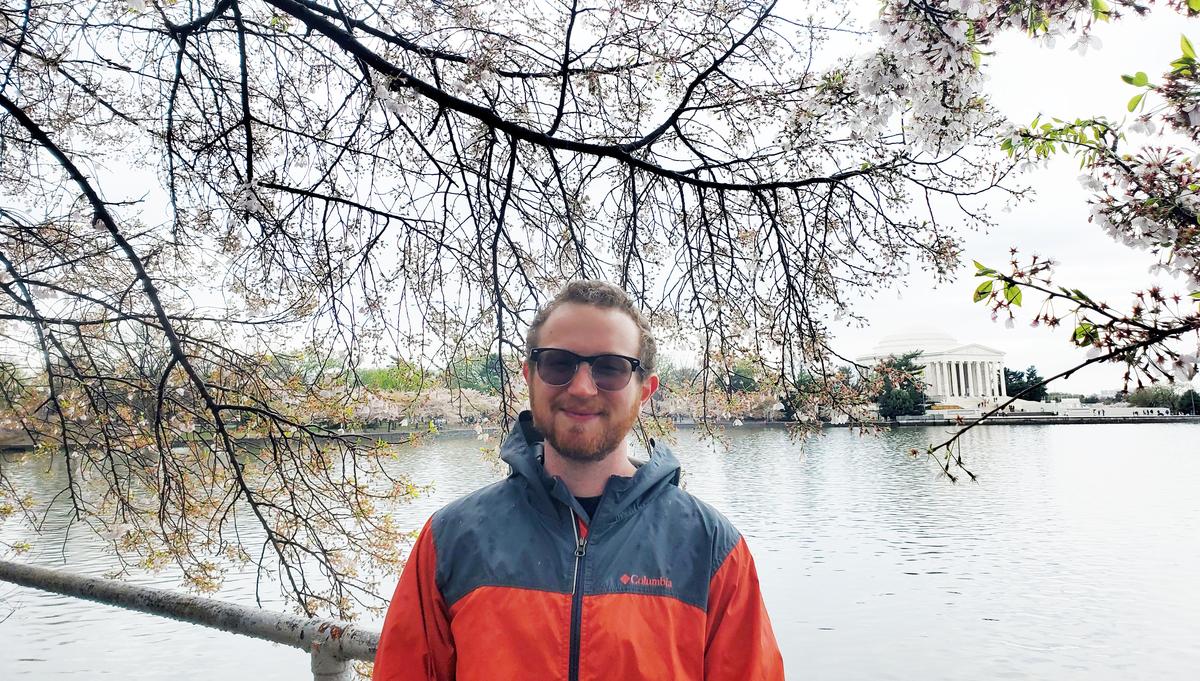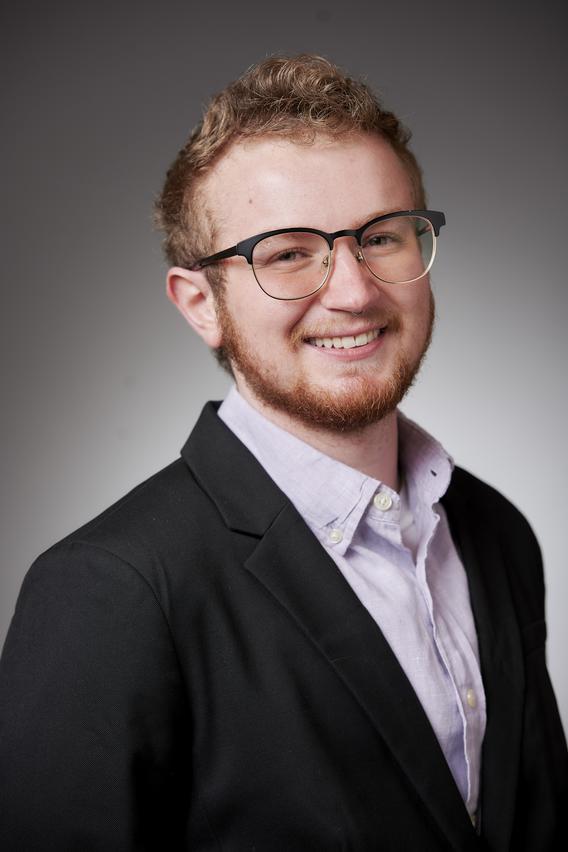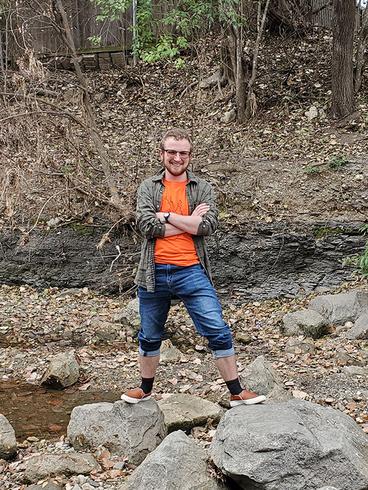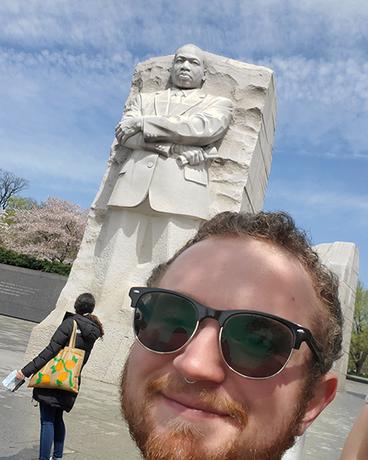
Our May 2023 communications column is by Minnesota Sea Grant (MNSG) Communications Associate Hannah Cullen.
Graduate students are bringing a fresh perspective to marine policy at the national level in Washington, D.C., as Sea Grant Knauss Fellows. The National Sea Grant John A. Knauss Fellowship places graduate students interested in ocean, coastal, and Great Lakes resources with host offices in the legislative and executive branches of government located in Washington, D.C., for a one-year paid fellowship.
Sea Grant Knauss Fellow Jackie Culotta is an ocean renewable energy interagency specialist for the U.S. Department of Energy’s Wind Energy Technologies Office and Water Power Technologies Office.
In this month’s Knauss Q&A, Jackie shares how they became interested in marine policy, why it’s important that graduate students are able to contribute to federal policy, and their experiences as a Knauss Fellow so far.
Jackie Culotta at the 2023 National Cherry Blossom Festival in Washington, D.C. Image credit: Jackie Culotta.
Meet Jackie Culotta.

“I’ve always been interested in the living, natural world, and how humans are an integral part of all of these ecologies, and obviously playing an increasingly determining role in them,” said Jackie.
While attending Carleton College in southern Minnesota, Jackie had the opportunity to study abroad in Australia and see the contrast between bleached, dead coral systems and preserved, vibrant coral systems of the Great Barrier Reef. This experience influenced the direction of Jackie’s undergraduate and graduate studies.
“I realized very clearly that the amount of greenhouse gasses that we’re putting out into the atmosphere is affecting, not just the air, but the oceans as well,” said Jackie. “For that reason, I decided to go into the more science, biology based side of things and learn more about oceans.”
Jackie earned a master’s degree in integrated biosciences from the University of Minnesota Duluth. Their graduate research focused on developing deterrent systems to prevent the movement of invasive species, particularly bighead carp and silver carp from moving into new ranges of rivers and lakes.
These fish are considered invasive because they are non-native to the United States, and their filter-feeding tendencies allow them to rapidly consume nutrients in waterways that are necessary for other aquatic organisms to thrive, which is how they can completely take over aquatic ecosystems.
The presence of these invasive species is not just detrimental to aquatic ecosystems, but to humans, too. “Silver carp in particular have this very charismatic jumping behavior,” said Jackie. The motion and sound of a boat passing can startle these large fish, causing them to jump out of the water and threaten people who may be recreating on waterways where silver carp are present.

The goal of Jackie’s graduate research project was to determine if bighead carp and silver carp could be conditioned to avoid certain stimuli, namely sound, and CO2 gas that they are able to smell.
Jackie’s background as a scientist and curiosity of the natural world led them to develop an interest in turning their scientific knowledge and research into action, and the Knauss Fellowship seemed like the perfect opportunity for them to learn more about how that happens at the federal level.
Tell us about your interest in marine policy.
“It’s clear that our human societal actions are having really wide-ranging impacts on all of these different ecosystems,” said Jackie. “I’m coming from a science background on studying these effects as they are happening, but it was clear to me that I had, and honestly still do, only about three months into this fellowship, [a limited understanding] on the causes of how these sorts of decisions are made, especially at the federal level. I’m interested in policy and how scientists can help inform it, not just passively but with a mind to actually affect positive change.”
How did you learn about the Sea Grant Knauss Fellowship and why did you apply?
“I had heard of it through word of mouth through multiple different sources which was helpful. A roommate when I was living in Duluth had applied for it and seemed very excited about it. A family friend had applied years ago, and ultimately, I think she was the Chief of Staff at the Monterey Bay Aquarium. Having heard about it through multiple different channels, eventually I looked it up myself and it seemed like the place for scientists looking to learn more about the policy side of things,” said Jackie.
You've been a fellow for three months, what about your fellowship has surprised you so far?
“I guess I’m surprised at this point, how decisions at this level of government are actually made. It’s truly just a room of people, experts in their fields talking and sharing their opinions and thoughts. I’m not sure how I envisioned it beforehand, but I’m really grateful for the chance to see it happening,” said Jackie.
Why do you think it’s important for graduate students like yourself who are a part of the Knauss Fellowship to contribute to policy at the National level?
“I think graduate students represent a young population that’s interested in the future of this little blue dot that we are all living on. Especially coming at the tail end of the graduate career, I think we represent a group that has a very fresh expertise in our chosen fields, and are ready to share that and give back,” said Jackie.
Tell us about your typical day as a Knauss Fellow.
“A typical day, at least at this stage in the fellowship, is a lot of reading policy documents and descriptions, and executive actions to get a sense of the landscape,” said Jackie. “Quite a few meetings. All of these interagency working groups and task forces hold regular meetings to discuss their work, and so most of my day is sitting in on these meetings and getting a sense of how all of these different agencies are trying to work together to achieve the same goals. Taking a lot of notes and thinking about how the Wind and Water Power Technology Offices can help contribute to these interagency initiatives.”
What experience excites you most about your Knauss Fellowship?
“The opportunity to meet with so many engaged and passionate and skilled people, so far, has been the most exciting aspect. Just seeing the sheer number of folks who are dedicating their professional lives to solving these very real and complex problems; I’m very excited to meet those people and to join them,” said Jackie.
Outside of your work as a fellow in your office, have you been able to do anything fun or exciting around D.C.?

“I did have a chance to visit during the cherry blossoms, so I spent a lot of solo time walking around and just enjoying the sights, and seeing the monuments around the festival,” said Jackie.
What’s your one most important piece of advice to students considering applying to the Knauss Fellowship?
“Don’t sell yourself or your experience short. There’s one ocean, and it is very large, and all of these different topics intersect with various parts of it, so if you have expertise in any area of science or policy you can find an interest that you can plug into effectively. Kick imposter syndrome to the curb,” said Jackie.
More information about the Sea Grant Knauss Fellowship
- Minnesota Sea Grant Knauss Fellowship webpage.
- NOAA Sea Grant Knauss Fellowship webpage.
- Minnesota Sea Grant Knauss Fellowship - expression of interest.
- Contact Alex Frie, Minnesota Sea Grant research and fellowship coordinator for information.
What’s Minnesota Sea Grant doing for you?
- Sign up for Minnesota Sea Grant’s monthly newsletter for news, information and events.